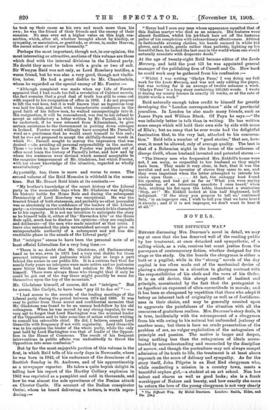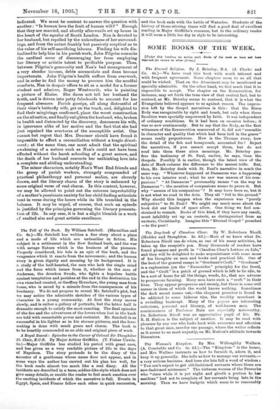NOVELS.
THE DIFFICULT WAY.*
BEFORE discussing Mrs. Dearmer's novel in detail, we may say at once that she has deserved well of the reading public by her treatment, at once detached and sympathetic, of a calling which, as a rule, receives but scant justice from the purveyors of contemporary fiction, whether designed for the stage or the study. On the boards the clergyman is either a butt or a pugilist, while in the "strong" novels of the day capital is too often made out of the mechanical device of placing a clergyman in a situation in glaring contrast with the responsibilities of his cloth and the vows of his Order. It is an old device, this abrupt conflict of instinct and principle, accentuated by the fact that the protagonist is as hypothesi an exponent of ultra-correctitade in morals ; and it has been so cheapened by repetition that those who adopt it betray an inherent lack of originality as well as of fastidious- ness in their choice, and may be generally counted upon to aggravate the painfulness of the situation with all the resources of gratuitous realism. Mrs. Dearmer's story deals, it is true, incidentally with the estrangement of a clergyman from his wife owing to his natural but unfounded jealousy of another man; but there is here no crude presentation of the problem of sex, no vulgar exploitation of the antagonism of principle and passion. The motive is larger and deeper, being nothing less than the antagonism of ideals accen- tuated by misunderstanding and reconciled by the discipline of sorrow, and though the portraiture may not always compel admission of its truth to life, the treatment is at least above reproach on the score of delicacy and sympathy. As for the story itself, John Pilgrim is an East End clergyman who, while conducting a mission in a country town, meets a beautiful orphan girl, —a student at an art schooL Nan has talent and charm as well as good looks; she is a frank worshipper of Nature and beauty, and how exactly she came to return the love of the young clergyman is not very clearly ft The D(okult Way. By Mabel Dearmer, London: Smith, Elder, and Co. Las.] indicated. We must he content to answer the question with another : "Is human love the fruit of human will P" Enough that they are married, and shortly afterwards set up house in the heart of the squalor of South London. Nan is devoted to her husband, but repelled by the unloveliness of her surround- ings, and froul the outset frankly but passively sceptical as to the value of his .self-sacrifieing labours. Finding his wife dis- inclined to help him in his parish work, John Pilgrim commits the cardinal error of discouraging her from employing her literary or artistic talent to profitable purpose. Thus, between Pilgrim's generosity and Nan's bad management of a very slender income, debts accumulate and duns become importunate. John Pilgrim's health suffers from overwork, and in order to find the money to procure him the needful comforts, Nan in despair offers to sit as a model for a former student and admirer, Roger Wentworth, who is painting a picture of Elaine. She dares not tell her husband the truth, and is driven into petty falsehoods to account for her frequent absences. Parish gossips, all along distrustful of their vicar's butterfly wife, get on the track, and, delighted to find their misgivings confirmed, place the worst construction on the situation, and finally enlighten the husband, who, broken in health and distracted by the discovery, denounces his wife, in ignorance alike of her motive and the fact that she had just repulsed the overtures of the susceptible artist. One cannot but regret that Mrs. Dearmer should have found it impossible to effect a reconciliation without a tragic anoti- meat ; at the same time, one must admit that the spiritual awakening of a nature such as Nan's could not have been effected without the harsh schooling of a great sorrow, and the death of her husband converts her unthinking love into a complete and abiding understanding.
The minor characters, notably Nan's West End friends and the group of parish workers, strangely compounded of practical philanthropy and personal malice, are cleverly drawn, and the literary charm of the story is enhanced by some original verse of real charm. In this context, however, we may be allowed to point out the extreme improbability of a mother's passionate anxiety for her child finding articulate Tent in verse during the hours while its life trembled in the balance. It may be urged, of course, that such an episode is justified by the principles governing the literary presenta- tion of life. In any case, it is but a slight blemish in a work of exalted aim and great artistic excellence.
The Toll of the Bush. By William Satchell. (Macmillan and Co. 6s.)—Mr. Satchel has written a fine story about a place and a mode of life which are unfamiliar in fiction. His subject is a settlement in the New Zealand bush, and the war with savage Nature which is the business of the pioneers. Properly considered, his tale is an epic of the bush, and the vengeance which it exacts from the newcomers ; and the human story is given dignity and meaning by its background. It is
study of the half-hearted, the men who lack the single mind and the force which issues from it, whether in the case of Andersen, the drunken Swede, who fights a hopeless battle against temptation and perishes at the end in the destruction his own vices had created, or Geoffrey Hernshaw, the young man from home, who is saved by a miracle from the consequences of his hesitancy. We do not propose to reveal Mr. Satchell's plot, but we may notice the admirable sketches of the various types of character in a young community. At first the story moves slowly, and is rather a gallery of portrait; but the latter half is dramatic enough to satisfy the most exacting. The final episodes of the fire and the adventures of the lovers when lost in the bush are told with remarkable power and restraint. Mr. Satchell is as successful in his lighter as in his sterner picture; and the love- making is done with much grace and charm. The book is to be heartily commended as an able and original piece of work.
A Royal Rascal : Episodes in the Career of Colonel Sir Theophilus St. Clair, E.C.B. By Major Arthur Griffiths. (T. Fisher ljnwin. 6s.)—Major Griffiths has studied his period with great care, and has given us a very readable picture of life in the days of Napoleon. The story pretends to be the diary of the ancestor of a gentleman whose name does not appear, and in some ways the author has carried out his plan too well, for the book reads almost too much like a real diary. All the incidents are described in a terse, soldier-like style which does not give many details, or enable the reader to feel much emotion over the exciting incidents of which the narrative is full. Events in Egypt, Spain, and France follow each other in quick succession, and the book ends with the battle of Waterloo. Students of the history of those stirring times will find a good deal of excellent reading in Major Griffiths' s romance, but to the ordinary reader it will seem a little too dry in style to be interesting.



































































 Previous page
Previous page